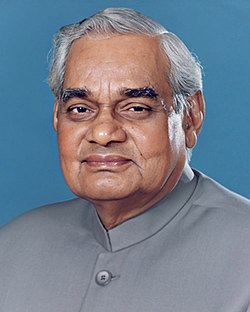First Atal Bihari Vajpayee ministry | |
|---|---|
| 17th ministry of the Republic of India | |
 | |
| Date formed | 16 May 1996 |
| Date dissolved | 1 June 1996 |
| People and organisations | |
| Head of state | Shankar Dayal Sharma |
| Head of government | Atal Bihari Vajpayee |
| Member party | Bharatiya Janata Party |
| Status in legislature | Minority |
| Opposition party | Indian National Congress |
| Opposition leader | P. V. Narasimha Rao (lok sabha) |
| History | |
| Election | 1996 |
| Legislature term | 16 days |
| Predecessor | Rao ministry |
| Successor | Deve Gowda ministry |
| ||
|---|---|---|
1996, 1998–2004
Legislations Treaties and accords Missions and agencies Controversies Wars and military operations | ||
| Gallery: Picture, Sound, Video | ||
Atal Bihari Vajpayee was sworn in as Prime Minister of India for first time on 16 May 1996.
Contents
BJP was well short of majority and looking for allies, but Vajpayee resigned after just 13 days since he could not muster enough support. The ministry was kept small because its fate was uncertain when swearing-in took place.
